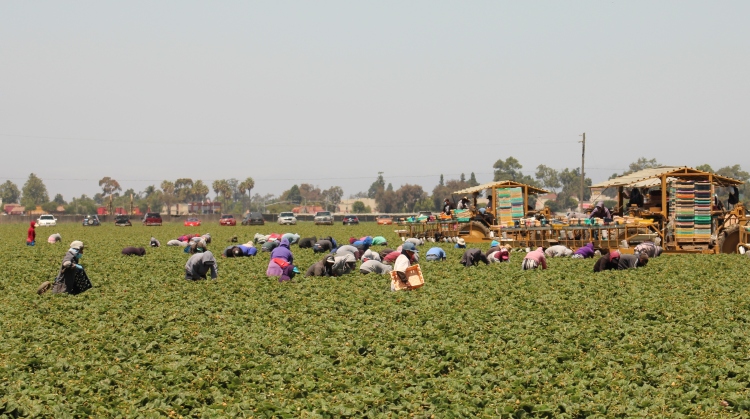By Joe Payne
A group of dozens of indigenous farmworkers in Santa Maria, California walked off the field on April 15 after a coworker requested higher pay and was fired, according to organizers.
Mixteco Indígena Community Organizing Project (MICOP) organizer Jeremias Salazar said the group of non-unionized fieldworkers quit in solidarity with their coworker, whose first name is Guadalupe, after she was let go following her request for a raise from $1.85 per box of produce to $2 and a confrontation with management of Hill Top Produce. Management told the workers to go the small agricultural company’s main office to pick up their last checks, Salazar explained, which is where they were when he arrived to connect and potentially help the laborers organize.
“I just started talking to them, getting to know them,” Salazar said. “We talked to them more about the situation, their rights, and what we can do to support them.”
MICOP community organizer Fernando Martinez joined Salazar and met with the workers, many of whom primarily speak Mixtec with Spanish as a second language, with the goal of helping them organize for a better outcome with the company. The hope was for everyone to keep their jobs, return Guadalupe’s employment, and see better pay for everyone.
“We wrote a letter, a call to action asking the employer to increase the payment and the working conditions, ” Martinez explained. “We reached out to the office to try and talk to the employer but they wouldn’t reply to us. So we went there and protested.”
Organizers with MICOP and many of the striking farmworkers put out the call on social media to join the protest, which saw many more people arrive in the afternoon to help swell their numbers. The protest easily passed 100 people crowded into the business office parking lot for the small farming company, Martinez said, including workers from other agriculture companies who came out to show their support.
“They know the work in the agricultural industry is very hard… overall a lot of people showed up,” Martinez said. “It was a peaceful protest, nobody damaged anything, they were just there to raise awareness of their pay and conditions.”
The negotiations included a back and forth with the company, which had offered a 10 cent raise per box, from $1.85 to $1.95, in response to the work stoppage, and then offered $2 after the workers refused to budge. By the end of the negotiations, the farmworkers were able to ensure a rate of $2.10 per box, 10 cents more than Guadalupe’s first request, and return her employment with the company. Everyone returned to work the next day at the new rate of pay.
A motivating factor for the farmworkers, who mostly come from indigenous backgrounds, was the way Guadalupe was treated during her initial request for the raise, Salazar said. Beyond her firing, she was also talked down to and laughed at for the way she used Spanish, something that indigenous Santa Marians contend with regularly, he explained.
“Guadalupe, she hardly speaks Spanish, but when she’s trying to speak about her rights, obviously she gets nervous and intimidated by people,” Salazar said. “When you speak in a second language and get intimidated you get nervous, so that seems why people make fun of them when they are speaking up for their rights. They make fun of indigenous people for speaking their language.”
MICOP serves indigenous communities on the Central Coast from Santa Maria to Oxnard in myriad ways, from help with translation to navigating public and social services to even running a Mixtec language radio station, Radio Indigena 94.1 FM. The radio station has been invaluable for informing indigenous communities across the Central Coast on a variety of issues, most pressingly coronavirus information and COVID-19 safety measures.
Farmworkers were hard hit by coronavirus early in the pandemic, counting as some of the first-recorded COVID deaths in Santa Maria. The northern part of the valley also includes the highest rate of infection in Santa Barbara County, with the average of 20 per 10,000, showing the virus spread most throughout the majority Latino/Latina area of the Santa Maria Valley.
The health precautions in the fields regarding the pandemic were also among the striking workers’ concerns, Salazar explained, along with other ongoing safety and health conditions.
“I guess the bosses were not providing them with masks or gloves, … and when they go and are done picking up a box, they were not given enough space between people,” he said. “Also, they are picking strawberries while they are spraying chemicals, the restrooms are not clean, the water is not clean. There are a lot of things going on.”

Salazar grew up indigenous in the Santa Maria Valley at a time when there were fewer Mixtec speakers in the local schools and there was less awareness of the language barriers. Salazar said he’s grateful to work for an organization like MICOP, a nonprofit that allows him to help local indigenous workers with the unique challenges they face, from barriers to access to wage theft.
“I’m super happy I’m working for MICOP. As a Mixteco myself I went through a lot of things, and I’m just really happy to be able to help the community,” he said. “We need more people to know what’s happening; the Central Coast is a big area… with the pandemic, things have been kept quiet, … and with the indigenous community, people are coming together and making changes.”
Hill Top Produce did not respond to multiple calls seeking comment as of publishing time.
For more information about Mixteco Indígena Community Organizing Project (MICOP), visit mixteco.org.

Donate!
Your donation can help me provide independent journalism covering local, national, and worldwide news along with the analysis and commentary you trust me to provide.
$5.00
